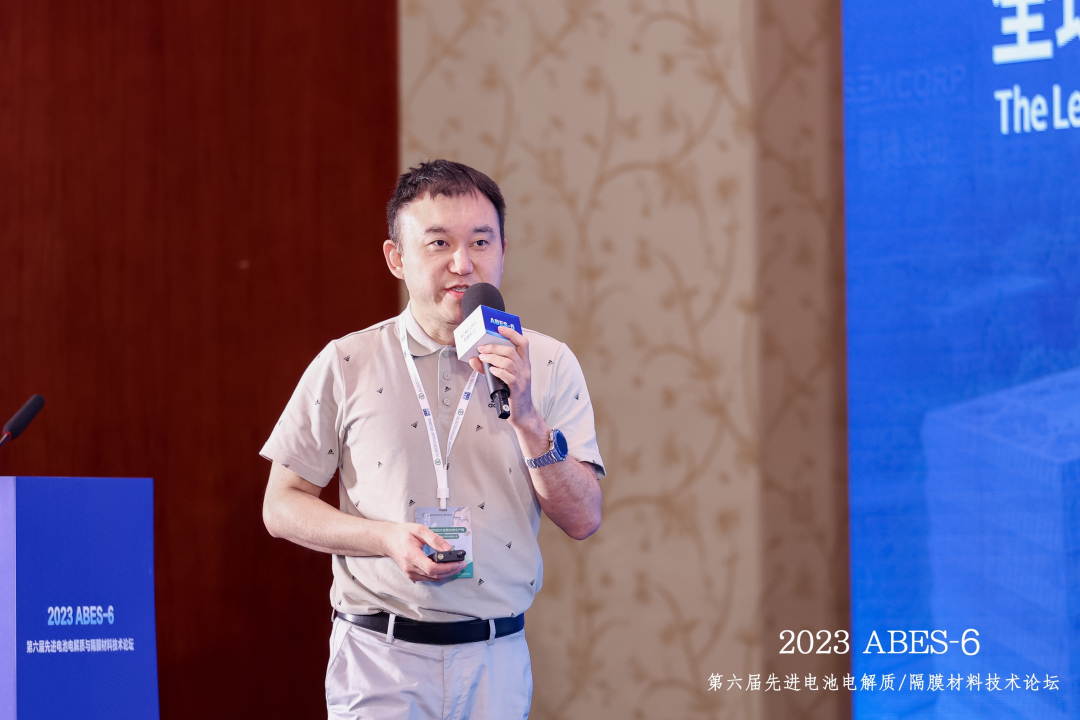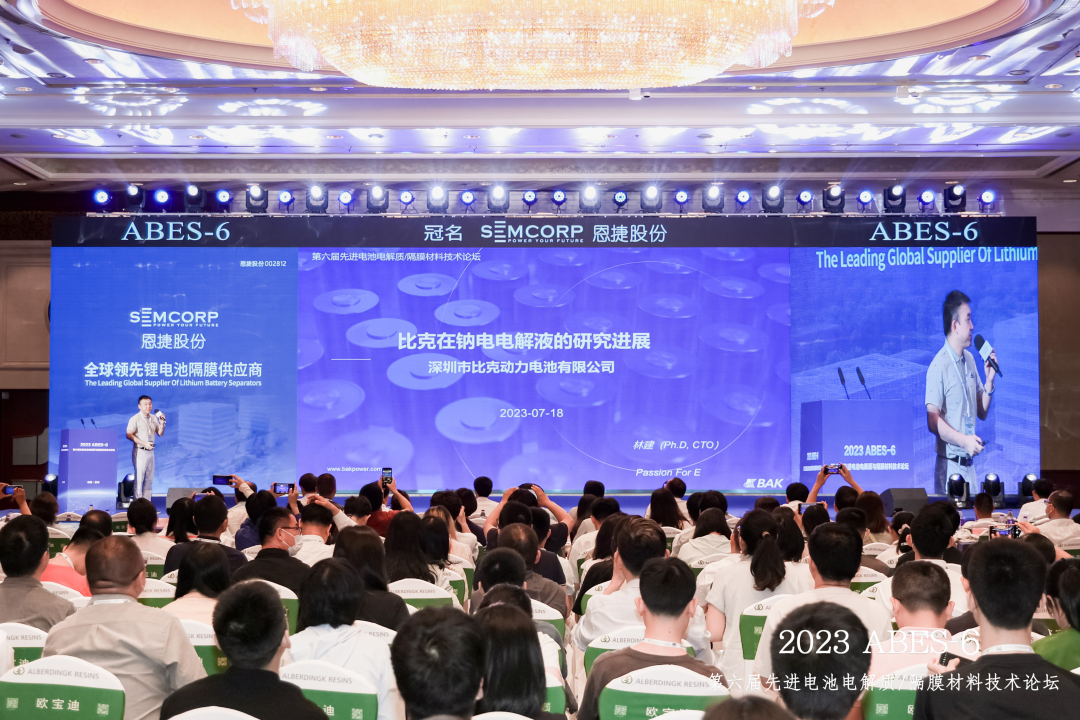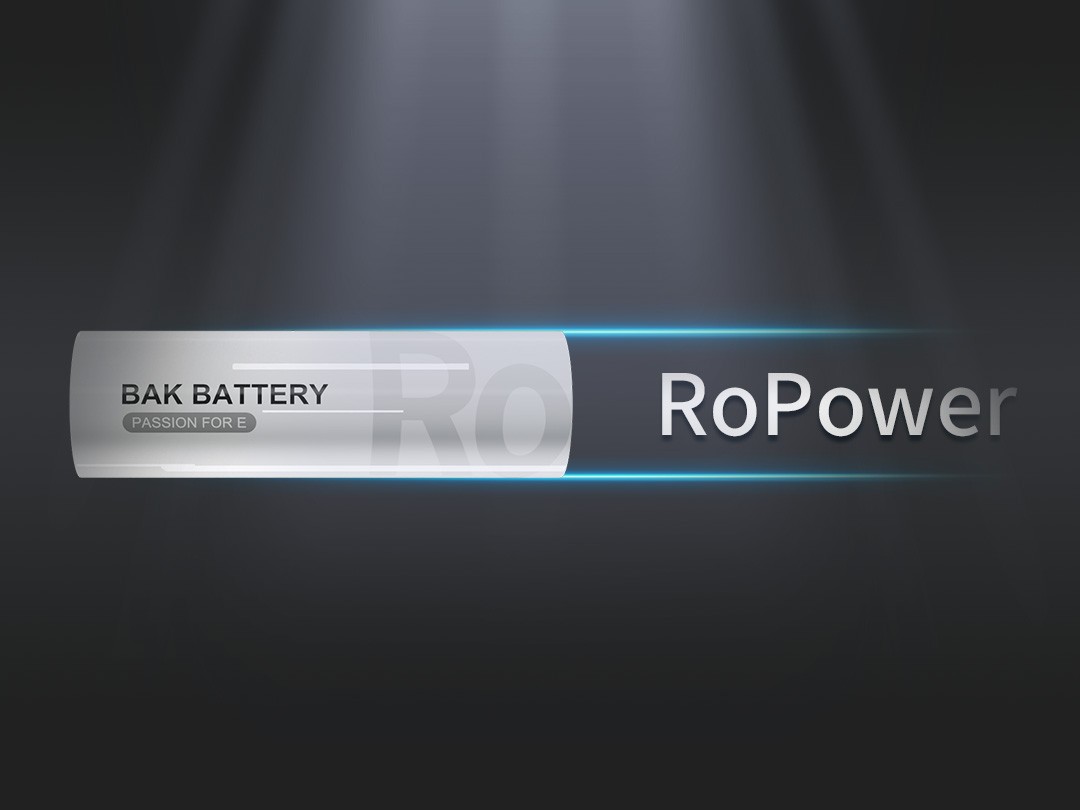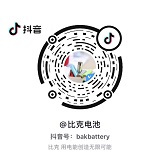Sharing the cutting-edge research achievements in the field of semi-solid sodium-ion batteries, BAK Battery participated in the conclusion of the 2023 ABES-6 International Forum
Utilizing the semi-solid state and sodium-ion technology, BAK Battery is currently delving into a novel path for enhancing the performance of sodium-ion batteries. On the 18th and 19th of July, 2023, the 6th International Forum on Electrolyte & Separator Materials for Advanced Batteries (ABES-6) was grandly held in Suzhou. Dr. Lin Jian from Shenzhen BAK Power Battery Co., Ltd. took the stage to share the latest research advancements in sodium-ion electrolytes. During the forum, Dr. Lin engaged in extensive discussions and exchanges with distinguished experts, industry peers, and other esteemed guests from both domestic and international spheres, exploring the forefront of semi-solid state sodium-ion battery technology for its high-quality development.

Dr. Lin Jian from BAK Battery delivering a speech and sharing insights
Sodium-ion technology, as an effective complement to lithium-ion, is witnessing vast prospects for development. Among its crucial components, the electrolyte plays a pivotal role as it directly influences the electrochemical performance of the battery. Currently, researchers are actively engaged in the development of novel electrolytes and exploring the interactions between the electrolyte and electrode materials to enhance the electrochemical stability and overall performance of the battery.
In the experimental process, scientists have chosen to incorporate certain additives to elevate the ion conductivity and electrochemical stability of the electrolyte. Dr. Lin Jian expounds, "In 2021, BAK Battery commenced its preliminary research on sodium-ion technology, adopting the cathode layer oxide and anode hard carbon technology as the complete electrode material. After conducting extensive experiments with sodium-ion electrolyte additives, it was discovered that under the dominance of cathode layer oxide gas generation, the addition of cathode film-forming agents effectively suppresses undesired reactions between the cathode and the electrolyte, leading to a substantial improvement in the high-temperature cycling performance of the battery. Moreover, the new film-forming additive, characterized by low film impedance, successfully insulates the electrolyte from the anode and cathode reactions, resulting in enhanced performance both at high and low temperatures." Building on this foundation, "the emergence of semi-solid state electrolytes has imposed constraints on the liquid electrolyte, thereby enhancing interface stability, significantly boosting battery cycling performance, and mitigating gas generation," Dr. Lin Jian further elaborated.

Dr. Lin Jian delves into an in-depth exposition on semi-solid state sodium-ion technology
While delving into the study of electrolytes, BAK conducted an investigation into the valence state of elements in the most mature sodium-ion system. Dr. Lin Jian pointed out, "Among the mature layered oxides containing copper found in the market, the copper element can undergo a valence change process, rendering the material highly stable even in the presence of air and moisture. This adds numerous benefits to the battery slurry preparation process, such as the use of single crystals for many materials, further increasing the compactness of the material, and maintaining excellent battery cycling performance."
Moreover, based on the research findings, BAK Battery has initiated the pilot sample phase. Dr. Lin Jian stated that, in terms of rate performance, sodium-ion batteries exhibit significantly superior rate charging and discharging capabilities compared to lithium-ion batteries. Regarding high and low-temperature performance, even at minus 40 degrees Celsius, lithium-ion batteries are unable to discharge, whereas sodium-ion batteries can release more than 50% of their room temperature capacity. In terms of room-temperature cycling, it is estimated that the performance will remain excellent even after more than 2000 cycles. As for safety performance, standard safety tests for the battery, including a 150°C thermal box test, needle puncture, and heavy object impact, indicate that the safety of sodium-ion batteries falls between that of lithium-ion ternary and iron lithium batteries, providing reassurance.
Currently, the development momentum of sodium-ion technology continues to grow. According to the "White Paper on the Development of Sodium Ion Battery Industry in China (2023)," the Chinese production capacity of dedicated sodium-ion batteries has reached 10 GWh, an increase of 8 GWh compared to the end of 2022. It is expected to reach 39.7 GWh by the end of this year. As one of the Chinese companies that entered the lithium-ion field earlier, BAK Battery is determined to seize the new window of opportunity in the sodium-ion development, continuing to cultivate the new energy track, and contributing its greater efforts to the construction of a cleaner and more sustainable future for humanity's well-being.
Other News
-
BAK Unveils Breakthroughs in B...
BAK Unveils Breakthroughs in Big Cylindrical Battery Tech at CBIS 20...
+More17 2025-11 -
BAK Battery Launches RoPower...
BAK Battery Launches RoPower Series: Next-Gen Power for Humanoid ...
+More19 2025-11





